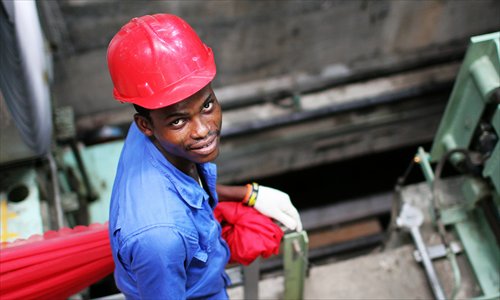China-Africa: Mending the bond

A local hired by a Chinese company works in a steel mill in Nigeria on April 18. Photo: CFP
Although investment from Chinese investors in Africa are on the rise, the relationship between the investors and their local hosts has never been easy.
Among the reasons for this state of uneasiness is the few numbers of locals that Chinese investors employ.
Nowhere is this more evident than in Zambia, one of the leading recipients of investment from China in Africa.
At the height of presidential campaigns in 2008, President Michael Sata, then a leading contender, blasted Chinese investors for ferrying their fellow citizens to push wheelbarrows when local Zambians lacked jobs.
According to private market analysts, China's economic rendezvous with Africa has undergone a major transformation in recent years, following disapproval of its policies and projects in some countries.
All over Africa, governments and their citizens were blaming the Chinese investors for hiring foreigners, namely Chinese nationals.
James Shikwati, executive director at the Inter Region Economic Network told the Global Times that there are Chinese communities in many African countries. Various estimates show that roughly 1 million Chinese reside in Africa, engaging themselves in various forms of activities.
Several African governments had to step in to insist that the Chinese companies hire more locals.
But that might soon change.
Cultural change
One Chinese-led institution set up in Nairobi, capital of Kenya aims to change the negative perception of Chinese investors.
China Information and Culture Communication (Kenya)Ltd (CICCK) set up shop in Nairobi - thanks to the forward-looking Embassy of China - with the aim boosting the number of Kenyans with some level of proficiency in the Chinese language and link them to potential Chinese investors for employment.
CICCK focuses on developing business communication skills relevant to Chinese investors among the Kenyan youth.
It was also set to enhance cultural exchange between Kenya and China. "This will go a long way to allay existing fears about the Chinese investors. We hope the larger number of locals taken up by the investors will lead to alleviation of the high unemployment rates," Gao Wei, the CEO of CICCK, told the Global Times.
Gao is also providing opportunities for African businesspersons to tour China, besides providing them with the basic knowledge of Putonghua that comes in handy when engaging with potential partners in China.
An employee at CICCK said Chinese cultural classes are organized to match the real needs of interested learners.
The CICCK idea came in the nick of time. Before the initiative, people like Gitau Ragu, a Nairobi-based businessman with interests in China, had to turn to YouTube to learn Putonghua.
Gitau told the Global Times he struggled to learn the basics that could enable him to get his way around Chinese streets as well as haggle for better prices whenever he visited for business.
Today, firms like CICCK are needed all over Africa. The number of Chinese investors and tourists as well as Africans doing business in China is on the rise.
Turning point
This has taken place against the backdrop of economic globalization and China's reform and opening-up, as well as decades of development. Africa has now become an important stage for China's "going out" strategy.
Reports from around Africa show that many Chinese investors now focus on hiring locals.
In 2010, then Chinese Vice President Xi Jinping, during a visit to Angola at a meeting with Chinese investors in the country, requested that Chinese firms in Africa assimilate into local society both economically and culturally.
As if to take up the cue from Xi, reports from across Africa show many of these firms now seem to have changed their employment policies and are now hiring more locals.
For example, Michael Bo, a consultant for Sinopec International Petroleum Service Corporation in Nairobi, told the Global Times that 95 percent of its employees are locals. "We are first attracted by skills and the ability to do what we set out to do," said Bo. He added that his firm works in Africa out of love.
In Kenya, the Chinese firm clinched a $140 million geothermal power project contract in 2012.
Huang Guo, deputy director of Sinopec International Petroleum Service Corporation, said much of the work done at the project site is by locals.
"They are doing marvelously well and have so far covered 10 percent of the work that needs to be done," he says.
In Botswana, Labor and Home Affairs Minister Edwin Batshu came to the defense of a Chinese firm after it was claimed in parliament that a Chinese construction company building a shopping complex in the Kanye area refused to employ Batswana.
Batshu said the Chinese company has employed nine Chinese nationals and 77 Batswana, stressing that 44 of these came from the neighborhood.
Investment and vitality
Over the last decade, China has pumped billions of dollars into Africa. The sum trade volume between China and Africa was $166.3 billion in 2011, compared with $10 billion in 2000.
Thanks to aggressive incursion, China has now surpassed the US and the EU as Africa's leading trading partner. This has come about through agreements on trade, economic and technical cooperation with well over 45 African countries.
The number of Chinese enterprises in Africa has surpassed 2,000, with a total investment of more than $30 billion. Africa has become China's fourth largest overseas investment destination.
Chinese enterprises have constructed a large number of roads, railways, ports and other infrastructure in Africa. To be specific, they have completed more than 2,000 kilometers of railways and more than 3,000 kilometers of roads.
In addition, China has begun building six economic and trade cooperation zones in five African countries - Zambia, Egypt, Mauritius, Nigeria and Ethiopia.
These zones have injected new vitality into Africa's industrialization.